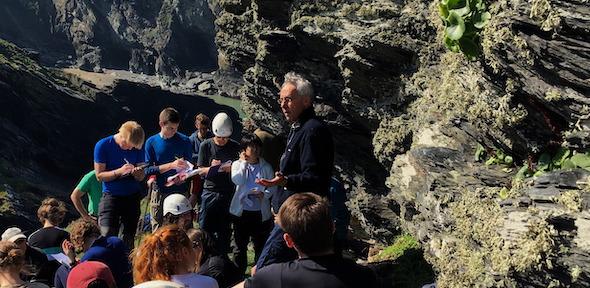
Exploring Earth's Natural Laboratory
Fieldwork allows our students to expand their knowledge of Earth Sciences by experiencing the subject in its natural laboratory. Students are not expected to be experienced outdoor enthusiasts, who have spent years hiking around wild moorland in the pouring rain.
Our field trips are designed to provide a wide range of practical experience in geology and geophysics—helping to further understanding of lecture material, and building up practical observation and interpretation skills. Students not only observe and map rocks, but also have first-hand exposure to the underlying processes that shape our planet.
Our Field Courses
Students have the option of several field trips throughout their four-year course, including a four-week independent mapping project in the Summer after second year.
First Year (Part IA):
- Ketton Quarry—half-day in Michaelmas Term.
- Isle of Arran—one week during the Easter break.
Second Year (Part IB):
- Sedbergh—ten days at the end of the Summer break prior to second year.
- South West England—ten days during the Easter break.
Third Year (Part II)
- Isle of Skye—12 days at the beginning of the Summer break prior to third year.
- Independent mapping—four weeks over the Summer break prior to third year.
- Greece—nine days at the beginning of the Christmas break.
Fourth Year (Part III):
- Spain—eight days during the Easter break.
What To Expect On A Field Course
The exact itinerary for each field course will differ, but in general students can expect to spend 09:00–17:30 in the field each day, exploring approx. 3–5 outcrops/localities. Each outcrop takes around 30–60 minutes—allowing students enough time to examine the outcrop, discuss their observations with demonstrators, fill in their notebook, and then debrief with the course leader.
On all field courses, everyone stays in either B&Bs, apartments, hotels, or cottages—as a good night's rest and good food is a priority. Students are transported to the first locality by coach or minibus. Then they will either walk or travel by minibus between localities. Lunch is often provided by the accommodation or bought on the way to the first locality.
In the evenings, after dinner at the accommodation, small groups of students present their observations and interpretations of outcrops that they've seen that day. Presentations are followed by free time.
Financial Support For Field Trips
Field trips are heavily subsidised by the Department, but students are charged around £80 (£65–130 depending on the trip) to cover some of the costs.
Students will also require some essential outdoor gear (rucksack, walking boots, waterproofs, and a hand lens), which need not be expensive. Advice on purchasing field gear is available from older students and department members.
The Department of Earth Sciences has a Fieldwork Fund (sponsored by alumni) to ensure that fieldwork is an exceptional experience for all our Cambridge Undergraduates, giving them the same outstanding opportunities as their predecessors. Contact our Department Administrator for more details. Financial support is also available from individual colleges.
More information about our field courses is available on our current undergraduate pages.
